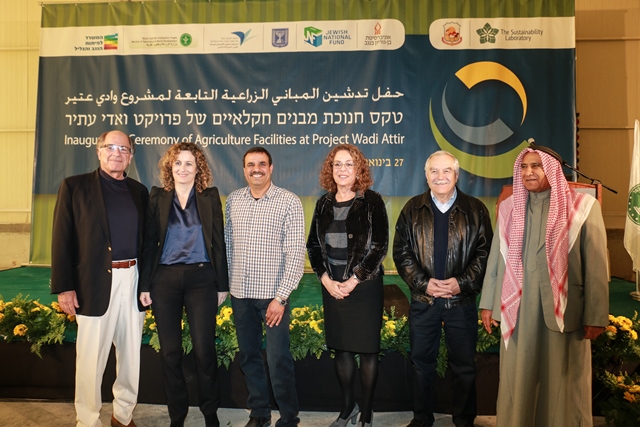Wadi Attir, a unique sustainable agriculture project which fuses traditional Bedouin agricultural and husbandry practices with modern renewable energy technology and farming techniques was officially inaugurated last week. The radically innovative desert farming operation to benefit the Negev Bedouin community is located on a 100 acre hilly site some 10 miles east of Beer-Sheva, near the Bedouin town of Hura.
Seven years from conception to launch, the $10 million Wadi Attir Project was initiated by Hura mayor Dr. Muhammad El-Nabari, and Dr. Michael Ben-Eli of the New York-based Sustainability Laboratories. Joined by researchers from BGU's Jacob Blaustein Institutes for Desert Research, the ambitious project is the outcome of a new vision of sustainable development.
The revolutionary project establishes an eco-village intended not only to benefit the local community by creating sustainable economic opportunities, but – if successful – be applied to other parts of the region and arid regions around the world.
Speaking at the inaugural ceremony president Rivka Carmi thanked the BGU researchers who have been deeply involved in the project and the visionary support of Josh Arnow who supported Wadi Attir from the outset. “The Arnow Family and their Foundation have supported education and sustainable economic growth in the Bedouin community for over 15 years. They are real pioneers who are making a difference in the region.” They were joined by other American donors, the Jewish National Fund (JNF-US) and the Israeli government.
The Bedouin Arabs’ extensive knowledge of the desert has gradually disappeared as a result of the influences of modern life. The Wadi Attir project’s primary objective is to preserve and nurture traditional Bedouin agricultural know-how, while providing income.
The model community comprises three areas: the production of dairy and meat products from sheep and goats, growing medicinal plants and raising indigenous vegetables based on seeds from the area. All the products will be organic. The farm, when completed, will include composting facilities, solar and energy recycling facilities and a training and administrative center.
“This is something really new and unique,” declared Michael Ben-Eli “We’ve linked the glory of the past with the strength of the future.”
The BGU researchers include at this stage Prof. Isaac A. Meir, coordinating the BIDR scientific and technical team; Prof. Amit Gross, working on wastewater and solid waste treatment; Dr. Stefan Leu, focusing on silviculture and soil enhancement aspects; Kobi Nahon, Michal Barak and Menachem Ofir, working on the detailed design of the various buildings, agricultural, technical and assorted structures and facilities. Many others have taken part at different stages of the project.

Above (left to right): Dr. Michael Ben-Eli of the New York-based Sustainability Laboratories; Sigal Shaltiel-Halevy, Director-General of the Ministry for the Development of the Negev and the Galilee; Dr. Muhammad El-Nabari, Mayor of Hura; BGU President Prof. Rivka Carmi; M.K. Yair Shamir, Minister of Agriculture and Rural Development; Sheikh Yusuf Al Asibi. Photo Credit: Wolfgang Motzafi-Haller
